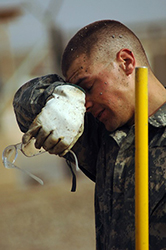 Although the human body naturally cools itself, continuous exposure to extreme heat can overwhelm those mechanisms, leading to illness and even death.
Although the human body naturally cools itself, continuous exposure to extreme heat can overwhelm those mechanisms, leading to illness and even death.
The following are four types of heat-related ailments listed in order of severity (four being the most severe). Even a less severe condition can become more severe unless steps are taken to remedy the problem as early as possible.
Heat Cramps – painful muscles spasms in the arms, legs, or abdomen, often with dizziness, weakness, and profuse sweating. Such cramps actually occur more often in well-conditioned people after prolonged heat exertion and are caused by the loss of sodium through sweating. Increasing daily sodium intake slightly during hot weather exertion can help prevent cramping.
Heat Syncope – fainting caused when the body compensates for too much heat by diverting blood from the brain to the skin. Heat Exhaustion – extreme fatigue with muscle aches, nausea, and fever. Additional symptoms can include clammy skin, diarrhea, rapid pulse, vomiting, and weakness.
Heat Stroke – failure of the body’s temperature control systems. Symptoms can include disorientation, agitation, hyperventilation, racing pulse, lethargy, convulsions, and eventually loss of consciousness. The body temperature rises to extremely high levels, sometimes above 110 F.
Helping a victim of heat-related illness:
- Take the person out of the heat.
- Loosen their clothing.
- Apply cool, wet cloths (not freezing or cold) and/or soak the victim’s clothing with water.
- Elevate the feet eight to 10 inches.
- And, if the person is conscious and not vomiting, offer plenty of fluids.
Preventing heat-related illness:
- Wear loose-fitting, lightweight, light-colored clothing.
- Use sunscreen to prevent sunburn, which can hinder the skin’s ability to cool itself.
- Wear a hat that provides shade and allows ventilation.
- Limit vigorous activity during hot, humid weather.
- Drink plenty of water — even more than you need to satisfy your thirst — before, during, and after exercise. Drinks with sugar and/or caffeine will not help; they actually rob your body of fluids. Alcohol causes you to lose more fluid than you consume.
- Avoid hot, confined places. If you can’t, then work in shifts. Work a while, and then rest in a cooler place for a few minutes.
- Electric fans might provide comfort, but when the temperature is in the high 90s, fans will not prevent heat-related illness.
- Some prescription and over-the-counter drugs can interfere with the body’s ability to regulate temperature. Discuss with your doctor whether any of your medications might have this effect and, if so, be especially careful to limit your exertion and drink plenty of water.
At the first sign of heat illness such as cramps, nausea, dizziness, or severe headaches, get away from the heat. Find a cool spot and rest for a few minutes and get some fresh air. Remember, it is easier to prevent heat illness than to treat it once symptoms develop. And always seek immediate medical help if you or a co-worker develops any of the symptoms described above.





